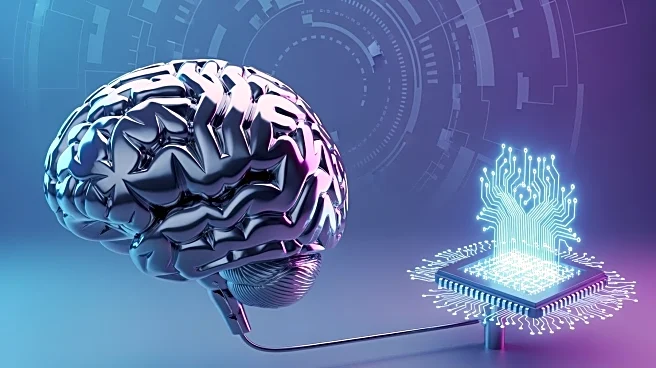What's Happening?
The concept of mind uploading, which involves transferring human consciousness into a digital format, is being explored by neuroscientists. Dobromir Rahnev from the Georgia Institute of Technology discusses the theoretical feasibility of this idea, which would
allow individuals to live digitally, retaining their memories and self-awareness without a physical body. The process would require a detailed mapping of the human brain's structure and functions, a task that remains a significant scientific challenge. Current technology lacks the capability to replicate the brain's complexity, including the need for sensory simulations to prevent mental health issues associated with sensory deprivation.
Why It's Important?
Mind uploading could revolutionize the way humans experience life, offering potential immortality and the ability to perform tasks beyond physical limitations. This concept could impact various sectors, including healthcare, by providing new ways to preserve human consciousness. However, the ethical implications are profound, raising questions about identity, the nature of consciousness, and the societal effects of digital immortality. The pursuit of this technology could drive advancements in neuroscience and computing, attracting significant investment from those interested in extending human life.
What's Next?
While the idea of mind uploading is still in its infancy, future advancements in brain mapping and computing power could bring it closer to reality. Researchers will need to overcome substantial scientific and technical hurdles, including understanding how the brain processes thoughts and emotions. The timeline for achieving mind uploading is uncertain, with optimistic predictions suggesting it could happen within the next century. Continued research and funding will be crucial in determining the feasibility and timeline of this groundbreaking technology.
Beyond the Headlines
The pursuit of mind uploading raises ethical and philosophical questions about the essence of human identity and the implications of living without a physical form. It challenges traditional concepts of life and death, potentially altering societal norms and values. The technology could also exacerbate existing inequalities, as access to digital immortality may be limited to those with significant financial resources. As research progresses, these broader implications will need to be carefully considered by scientists, ethicists, and policymakers.


















